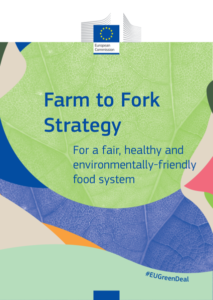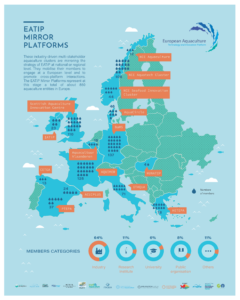New Year: New Members!
The EATiP Platform extend to all readers our best wishes for 2022! We look forward to a successful year full of innovation and development for our sector and stakeholders.
We begin this New Year in a very positive way by welcoming two new members to our network! Indicative of our multi-stakeholder nature, one member comes from the aquaculture industry, the other from aquaculture academia.
Ace Aquatec is an award-winning aquaculture technology company specialising in in-water electric stunners; automated waterjet bleeding; gentle contactless pumping; predator deterrents, biomass cameras and Sea Lice removal systems.
Ace Aquatec – one of two new members joining EATiP in January 2022
Ace Aquatec help their customers businesses to thrive by making their operations efficient, ethical and sustainable. With the high importance attached to aquatic animal health and welfare within European aquaculture, EATiP will certainly benefit from the knowledge and experience this company can bring. With a head office in Dundee (Scotland, UK) Ace Aquatec were co-founded in 1999 by inventor John Ace Hopkins and investor Annette Pyne-Carter after they saw the potential technological innovation could have in accelerating the adoption of responsible fish farming practices. The company project manages global R&D projects, manufacturing at two UK factories, and co-ordinate installers and engineers worldwide. The company also has a Canadian office and distribution partners in key markets.
Ace Aquatec has grown from a family run business into a global supplier of aquaculture solutions retaining a key focus on local partnerships and personal customised solutions and we are delighted to welcome them to our network – sure in the knowledge we will value their experience and knowledge.
From the academic side, The University of Stavanger (Norway) represents another type of Technology Platform membership category, bringing an additional wealth of expertise to our scientific and academic membership. The Department of Aquaculture offers a number of areas of specific knowledge and expertise, where the University is keen to collaborate with EATiP members and engage in both project and other activities. Specifically, the University seeks to engage in the areas of:
- Offshore Fish Cage Design, Environmental Load Modelling, Recirculating Aquaculture System (RAS), Artificial Reef, Contaminant Transport, Digital Twin Modelling, Fluid Mechanics and Dynamics, Turbulence Modelling
- Aquatic diseases, Emerging infectious diseases, Pathogen molecular biology and sequencing
- Innovation, Seafood markets, Competitiveness and resilience in Aquaculture
- Fish health, fish welfare, Environmental impact, Risk assessment
The University of Stavanger – brining a wealth of expertise to the EATiP Platform.
Welcoming the new members to the EATiP platform, President Gustavo Larrazábal commented “at a challenging time for both the European aquaculture sector and European citizens in general, we are delighted to welcome these two new members to our platform, demonstrating that collaboration and engagement in the fields of research and innovation remain strong within our sector. With the increasing emphasis on fish welfare in addition to fish health, and the ambitions set out in the Strategic Guidelines for European Aquaculture and Blue Economy, along Horizon Europe and the European Missions, the wealth of knowledge and expertise brought to EATiP through the University of Stavanger and Ace Aquatec will further extend and improve our contribution to the development of a sustainable and innovative European aquaculture sector.”
- Are you interested in joining EATiP? Please see here for further information or contact us via secretariat@eatip.eu


